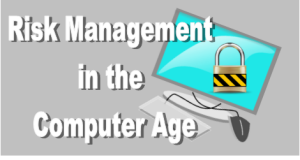Risk Management in the Computer Age
 Think before you e-mail. E-mail has become an informal mode of correspondence – and because of this, users are often less careful in their messaging. Offensive messages might be available to countless people in a newsgroup or listserv – and can be stored indefinitely on a hard drive. Discuss e-mail protocol with all employees. Discourage the use of crude language, personal references or jokes. Illegal or inappropriate transmissions could damage goodwill or lead to claims of discrimination, harassment or defamation.
Think before you e-mail. E-mail has become an informal mode of correspondence – and because of this, users are often less careful in their messaging. Offensive messages might be available to countless people in a newsgroup or listserv – and can be stored indefinitely on a hard drive. Discuss e-mail protocol with all employees. Discourage the use of crude language, personal references or jokes. Illegal or inappropriate transmissions could damage goodwill or lead to claims of discrimination, harassment or defamation.
Have a back-up e-mail plan. In August 1996, America Online was offline for more than 18 hours. Service disruptions such as this could significantly impede sending or receiving critical e-mail messages and may result in missed deadlines. It is a good idea to have a second Internet Service Provider account with another company to use during such an emergency.
Beware of the “Reply to All” function. When you receive an e-mail that has been mass distributed by the sender – and you want to reply only to the sender – be sure not to hit the “Reply to All” button since you will reply to everyone who received the original message, which may contain one or more unwanted recipients. To avoid this problem, set the default in your program to respond only to the sender – other recipients can be added manually.
Format your e-mail. Customize e-mail by using bold, italics, logos and different typefaces. Consider mail filtering that will automatically route messages containing certain key words to a designated file.
Deleted messages are not always gone. Deleted messages may still hide on your hard drive in directories titled “Saved Incoming Mail” or “Saved Outgoing Mail.” They can also be stored on backup tapes retained by the system administrator. E-mail might be discoverable in litigation. Companies, such as Electronic Evidence Discovery (EED) (currently known as Daticon EED) of Seattle, specialize in retrieving information from computer systems. In a celebrated suit, EED was hired by a plaintiff who bought land contaminated by hazardous waste. EED obtained electronic records from the seller and began sifting through e-mail messages. Among items recovered was an incriminating in-house message in which the seller acknowledged the presence of waste and stressed the importance of keeping this fact secret.
Who owns e-mail? Courts have held that e-mail created on the employer’s computer is owned by the employer. Ownership of e-mail received by the employer’s system is less certain. It is important that employees understand the extent to which they should or should not have an expectation of privacy in e-mail.
Include a “legal purposes” paragraph. Some e-mail should contain language that says the communication is for legal purposes only. This reinforces the seriousness of the message and will bolster the argument that the communication is privileged.
Develop a storage policy. Retain important messages on computer disk or tape. Decide how long the data should be kept. Purge unwanted files and reformat the system hard drive as a regular aspect of computer maintenance.
Develop an “e-mail only” client newsletter. This can be an excellent tool for marketing and client relations. Interesting articles and literature can be attached to the e-mail.
Publicize your e-mail address. Be sure to include your e-mail address on letterhead and business cards.




